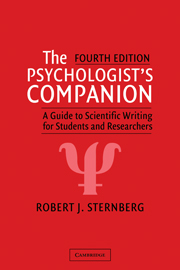Book contents
- Frontmatter
- Contents
- Acknowledgments
- Introduction
- 1 Eight Common Misconceptions about Psychology Papers
- 2 Steps in Writing the Library Research Paper
- 3 Steps in Writing the Experimental Research Paper
- 4 Rules for Writing the Psychology Paper
- 5 Using the Internet to Aid the Research Process
- 6 Commonly Misused Words
- 7 American Psychological Association Guidelines for Psychology Papers
- 8 Guidelines for Data Presentation
- 9 References for the Psychology Paper
- 10 Standards for Evaluating the Psychology Paper
- 11 Submitting a Paper to a Journal
- 12 How to Win Acceptances from Psychology Journals: Twenty-Nine Tips for Better Writing
- 13 Writing a Grant or Contract Proposal
- 14 How to Find a Book Publisher
- 15 Writing a Lecture
- 16 Article Writing 101
- References
- Appendix A Sample Psychology Paper
- Appendix B Writing for British and European Journals
- Index
2 - Steps in Writing the Library Research Paper
Published online by Cambridge University Press: 05 June 2012
- Frontmatter
- Contents
- Acknowledgments
- Introduction
- 1 Eight Common Misconceptions about Psychology Papers
- 2 Steps in Writing the Library Research Paper
- 3 Steps in Writing the Experimental Research Paper
- 4 Rules for Writing the Psychology Paper
- 5 Using the Internet to Aid the Research Process
- 6 Commonly Misused Words
- 7 American Psychological Association Guidelines for Psychology Papers
- 8 Guidelines for Data Presentation
- 9 References for the Psychology Paper
- 10 Standards for Evaluating the Psychology Paper
- 11 Submitting a Paper to a Journal
- 12 How to Win Acceptances from Psychology Journals: Twenty-Nine Tips for Better Writing
- 13 Writing a Grant or Contract Proposal
- 14 How to Find a Book Publisher
- 15 Writing a Lecture
- 16 Article Writing 101
- References
- Appendix A Sample Psychology Paper
- Appendix B Writing for British and European Journals
- Index
Summary
Most undergraduate research papers, and many graduate and professional research papers as well, are based upon library research. Library research can proceed smoothly if you follow a sequence of simple steps.
DECIDING UPON A TOPIC FOR A PAPER
Your first task is to decide upon a topic for a paper. This is, in a sense, the most important task because the paper can be no better than the topic. I have found five mistakes that repeatedly turn up in students' choices of topics.
The Topic Doesn't Interest the Student
Many students put off thinking about their choice of topic until the latest possible date. They then find themselves pressed to select a topic, and hastily decide upon something that is of only marginal interest to them. Procrastination in thinking about a topic is a mistake because interesting topics don't often pop into your head overnight. So allow yourself plenty of time to think of a topic. Then, if you are unhappy with the first few ideas that come to mind, you can try out others before you resign yourself to a topic that doesn't interest you. Unless you are at least somewhat interested in the topic you pick, you will find the exercise of doing library research a deadly bore, and your paper will probably show it. Having once written and having now read a large number of student papers, I am convinced that a major determinant of quality is the degree of interest the student sustains in the topic about which he writes.
- Type
- Chapter
- Information
- The Psychologist's CompanionA Guide to Scientific Writing for Students and Researchers, pp. 19 - 34Publisher: Cambridge University PressPrint publication year: 2003



